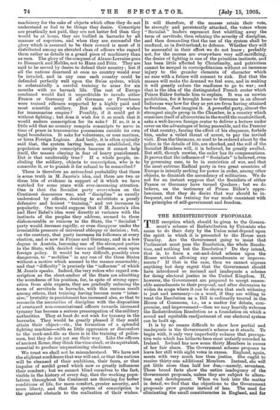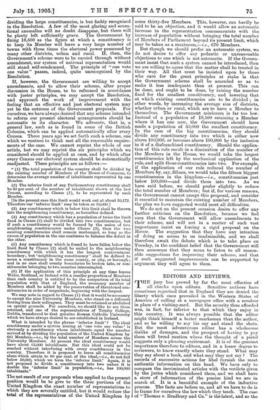THE REDISTRIBUTION PROPOSALS.
however, the Government are prepared to accept reason- able amendments to their proposal, and after discussion to widen its scope where it can be shown that such widening is just and necessary—in a word, if they are willing to treat the Resolution as a Bill is ordinarily treated in the, House of Commons, i.e., as a matter for debate, com- promise, and improvement—then we may heartily welcome the Redistribution Resolution as a foundation on which a sound and equitable readjustment of our electoral system can be built up.
It is by no means difficult to show how partial and inadequate is the Government's scheme as it stands. To begin with, it only very imperfectly reduces that preroga- tive vote which has hitherto been most unfairly accorded to Ireland. Ireland has now some thirty Members in excess of her fair share. The Government scheme proposes to leave her still with eight votes in excess. England, again, meets with very much less than justice. She ought to receive thirty-one additional Members. Instead, she will get little more than half her due,—namely, seventeen. These broad facts show the entire inadequacy of the Government proposals, unless they are subject to altera- tion and development. When we look into the matter in detail, we find that the objections to the Government proposals grow greater instead of less. The need for eliminating the small constituencies in England, and. for dividing the large constituencies, is but feebly recognised in the Resolution. A few of the most glaring and sensa- tional anomalies will no doubt disappear, but there will be plenty left sufficiently grave. The Government by fixing 18,500 as the figure at which a constituency is to keep its Member will leave a very large number of towns with three times the electoral power possessed by many other districts, urban and rural. If, then, the Government's scheme were to be carried through without amendment, our system of national representation would still stand, self-condemned. The principle of "one vote one value" passes, indeed, quite unrecognised by the Resolution.
If, however, the Government are willing to accept amendments, and to allow their scheme, after proper discussion in the House, to be refrained in accordance with juster principles, we may accept the Resolution, and approach the work of improvement with the feeling that an effective and just electoral system may yet be the outcome of the Government proposals. For ourselves, we have always desired that any scheme intended to reform our present electoral arrangements should be automatic in its character. We advocate, that is, a general law, such as is found in some of the British Colonies, which can be applied automatically after every Census. Three years ago we set forth such a scheme, one which we venture to think met all the reasonable require- ments of the case. We cannot reprint the whole of our article, but we may reprint the six principles which we considered should be applied at once, and by which after every Census our electoral system should be automatically readjusted. These principles are as follows :— "(1) The total population of the country shall be divided by the existing number of Members of the House of Commons, to determine the average number of inhabitants represented by one Member.
(2) The inferior limit of any Parliamentary constituency shall be 80 per cent. of the number of inhabitants shown at the last Census, according to Clause (1), to be represented by each Member.
[In the present ease this limit would work out at about 50,172. Therefore our 'inferior limit' may be taken as 50,000.] (3) Any constituency which is below this limit shall be thrown into the neighbouring constituency, as hereafter defined.
(4) Any constituency which has a population of twice the limit fixed in Clause (2) shall be divided into two constituencies, but
if such a constituency would be formed by the union of two neighbouring constituencies under Clause (3), then the two existing constituencies shall remain unchanged, so long as the excess of population in the one continues to balance the defect in the other.
(5) Any constituency which is found to have fallen below the limit fixed by Clause (2) shall be united to the neighbouring constituency with which it has the longest conterminous boundary; but neighbouring constituency' shall be defined to mean a constituency in the same county, or city, or borough ; and in no case shall county boundaries be broken into, or con- stituencies belonging to two counties intermingled.
(6) If the application of this principle at any time leaves Wales, Scotland, or Ireland with a smaller proportion of Members
than each country is entitled to by the comparison of its total population with that of England, the necessary number of Members shall be added by the preservation of threatened con- stituencies in order of magnitude, beginning with the largest.
We may note in regard to Clause (1) that it would be necessary to except the nine University Members, who stand on a different footing from their colleagues. They must be retained or abolished on special grounds. For ourselves, we should like to see them retained, and one of the representatives of Trinity College, Dublin, transferred to that genuine Boman Catholic University which we have always desired to see established in Ireland.
• What is intended by the phrase inferior limit' P The ideal constituency under a system aiming at 'one vote one value' is obviously a constituency whose inhabitants equal the number arrived at by dividing the population of the United Kingdom by 661 Members,—i.e., by the total number of Members minus the University Members. At present the ideal constituency would have about 63,000 inhabitants. But this ideal could not be reached without interfering with every constituency in the country. Therefore it is proposed to leave all constituencies alone which attain to 80 per cent, of the ideal,—i.e, do not fall below 50,000, which we term the inferior limit.' Again, it is not proposed to divide a constituency into two unless it is double the 'inferior limit' in population,—i.e., has 100,000 inhabitants."
The net result of our proposals when applied to the present position would be to give to the three portions of the United Kingdom the exact number of representatives to which they are severally entitled, but it would reduce the total of the representatives of the United Ki gdom by some thirty-five Members. This, however, can hardly be said to be an objection, and it would allow an automatic increase in the representation commensurate with the increase of population without bringing the total number of Members of Parliament beyond its present limit, which may be taken as a maximum,—i.e., 670 Members.
But though we should prefer an automatic system, we do not desire to offer any pedantic or unreasonable objections to one which is not automatic. If the Govern- ment insist that such a system cannot be introduced, then we are willing to agree that the matter shall be treated in their way. All that must be insisted upon by those who care for the great principles at stake is that the Government scheme shall be amended so as to make it less inadequate than at present. This can be done, and ought to be done, by raising the number fixed for the smallest constituency, and lowering that at which existing constituencies are to be divided ; in other words, by increasing the average size of districts, whether urban or rural, which are to have a, Member to themselves. The Government minimum is far too low. Instead of a population of 18,500 retaining a Member where it has one now, the Government should have made a population of 30,000 the smallest constituency. In the case of the big constituencies, they should divide any constituency into two which is either now above 100,000, or becomes above 100,000 by the inclusion in it of a disfranchised constituency. Should the applica- tion of this rule result in a diminution of the number of the Members in the House, we would take the largest constituencies left by the mechanical application of the rule, and split those constituencies into two. For example, if the application of our rule reduced the number of Members by, say, fifteen, we would take the fifteen biggest constituencies in the kingdom—i.e., constituencies just below 100,000—and divide them into two. As we have said before, we should prefer slightly to reduce the total number of Members ; but if, for various reasons, the Government cannot accept this proposal, and consider it essential to maintain the existing number of Members, the plan we have suggested would meet all difficulties.
We do not on the present occasion desire to offer any further criticism on the Resolution, because we feel sure that the Government will allow amendments to their scheme, and will not in a matter of such vast importance insist on forcing a rigid proposal on the House. The suggestion that they have any intention of doing so seems to us inadmissible, and we shall therefore await the debate which is to take place on Tuesday, in the confident belief that the Government will then announce that they mean to listen to all reason- able suggestions for improving their scheme, and that if such suggested improvements can be supported by argument they will agree to them.







































 Previous page
Previous page